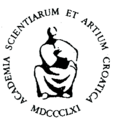HAZU symposium
TRANSLATION OF BASIC IMMUNOLOGY AND NEUROSCIENCE TOOLS TO THERAPIES: WHERE ARE WE NOW?
WHEN and WHERE:
Rijeka, University Campus
R. Matejčić 2, O-030
Symposium: July 4th 2016
Roundtable: July 5th 2016
Abstract submission deadline: May 30th.
Registration and snacks/refreshments will be provided free of charge.
Late registration is possible, but the abstracts submitted after the deadline will not be in the abstract book. For late registration, please email: This email address is being protected from spambots. You need JavaScript enabled to view it.
Participants that need the certificate of attendance from the Croatian Medical Chamber (Hrvatska liječnička komora) will need need to additionally register on the day of the symposium from 8 – 9 hr.
Organizers:
Department of Clinical and Transplantation Immunology and Molecular Medicine in Rijeka, THE CROATIAN ACADEMY OF SCIENCES AND ARTS
Department of Biotechnology, UNIVERSITY OF RIJEKA
Preliminary P R O G R A M
Monday, July 4th
9.00 – 9.30
OPENING & Welcome speeches
9.30 – 11.00
I. MOLECULAR MECHANISMS OF BRAIN DISORDERS
Dr. Christopher Miller, PhD (King’s College London, UK): ER-mitochondria associations in fronto-temporal dementia and ALS
Dr. Miranda Mladinić Pejatović, PhD (Department of Biotechnology, University of Rijeka, Rijeka, Croatia): Cell death and survival mechanisms after spinal cord injury: insight from in vitro animal models
Dr. Emanuele Buratti, PhD (International Centre for Genetic Engineering and Biotechnology, Trieste, Italy): Investigating the role of TDP-43 pathology in neurodegenerative and other diseases
11.15 – 12.45
II. INFLAMMATION AS DISEASE TRIGGER
Dr. Jonathan Ashwell, MD (National Cancer Institute, National Institutes of Health, Bethesda, USA): T cell p38: a therapeutic target in autoimmunity, inflammation, and cancer
Dr. Bojan Polić. MD, PhD (Faculty of Medicine, University of Rijeka, Croatia): Inflammation of visceral adipose tissue and development of type 2 diabetes
Dr. Ivana Munitić, MD, PhD (Department of Biotechnology, University of Rijeka, Croatia): Animal models for elucidating the role of adaptor protein optineurin during inflammation
12.45 - 14.15
POSTER session and buffet lunch with speakers
14.15 – 15.45
III. NEUROIMMUNOLOGY: AN INCREASINGLY COMPLEX AND VIBRANT FIELD
Dr. Stipan Jonjić, MD, PhD (Faculty of Medicine, University of Rijeka, Croatia): Congenital cytomegalovirus infection and neuroinflammation
Dr. Jasna Križ, MD, PhD (University of Laval, Quebec City, Canada): Alterations in microglia immune homeostasis drive neurodegeneration
Dr. Elsa Fabbretti, PhD (Center for Biomedical Sciences and Engineering, University of Nova Gorica, Slovenia): Molecular requirements for purinergic signaling in the control of pain sensitivity
16.00 – 18.00
IV. ENTERING THE BRAIN WITH NEW TOOLS: CAN WE SUCCESSFULLY TREAT NEURODEGENERATION?
Dr. Jean Pierre-Julien, PhD (University of Laval, Quebec City, Canada): Single chain antibodies for treatment of amyotrophic lateral sclerosis
Dr. Josef Priller, MD, PhD (Charité-Universitätsmedizin Berlin, Berlin, Germany): Therapeutic potential of myeloid cells in neurodegenerative diseases
Dr. Dinko Mitrečić, MD, PhD (Croatian Institute for Brain Research, School of Medicine, University of Zagreb, Zagreb, Croatia): Application of stem cells in brain diseases: lessons from stroke and amyotrophic lateral sclerosis
Dr. Angela Genge, MD, PhD (Montreal Neurological Institute and Hospital, Montreal, Canada): Clinical evidence for the role of inflammation in ALS and other neurodegenerative disorders
Tuesday, July 5th
11.00 - 13.00
Roundtable: “Interdisciplinary Approach to Complex Diseases”
In an attempt to emphasize the need and facilitate collaborative interdisciplinary projects, basic scientists, clinical researchers and practitioners are invited to discuss the importance of interdisciplinary research for understanding and treating complex human diseases. Benefits of translation of methods and technology, and sharing resources between disciplines will be discussed based on personal experiences and scientific and societal imperatives for such task.
THE SYMPOSIUM IS IN PART SUPPORTED BY HRZZ GRANT # 7459 to
Dr. Ivana Munitić








